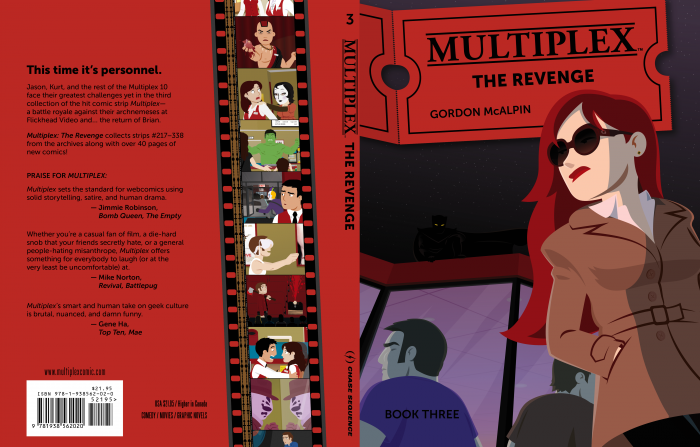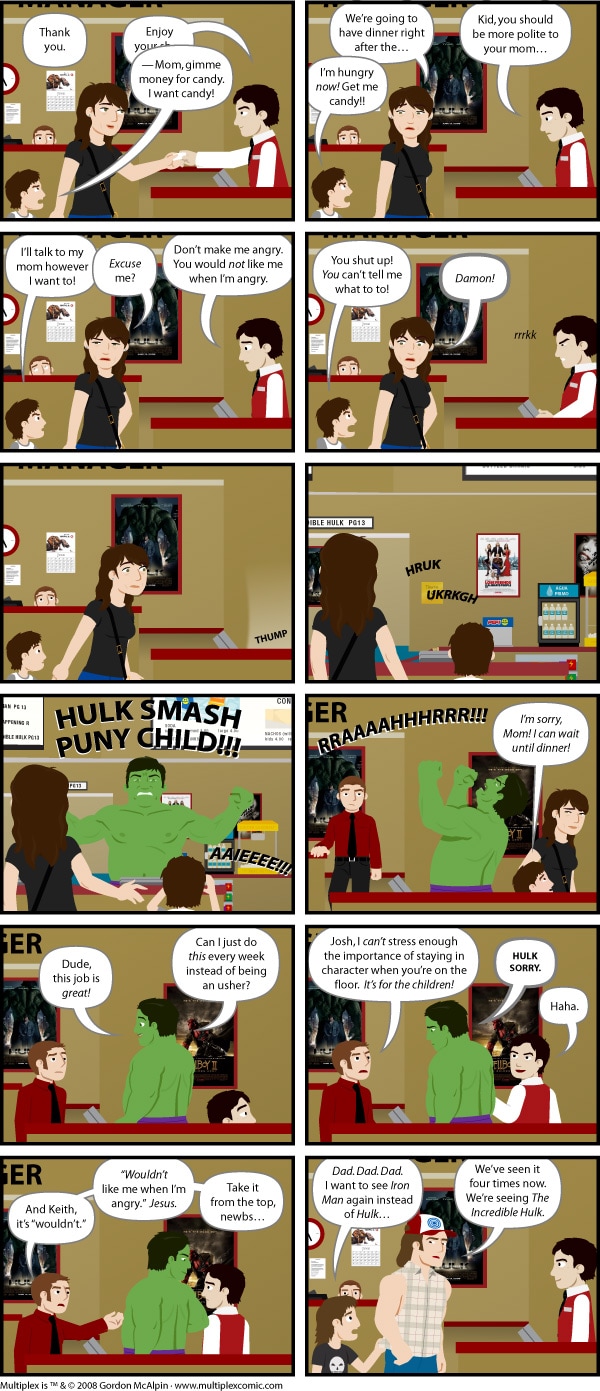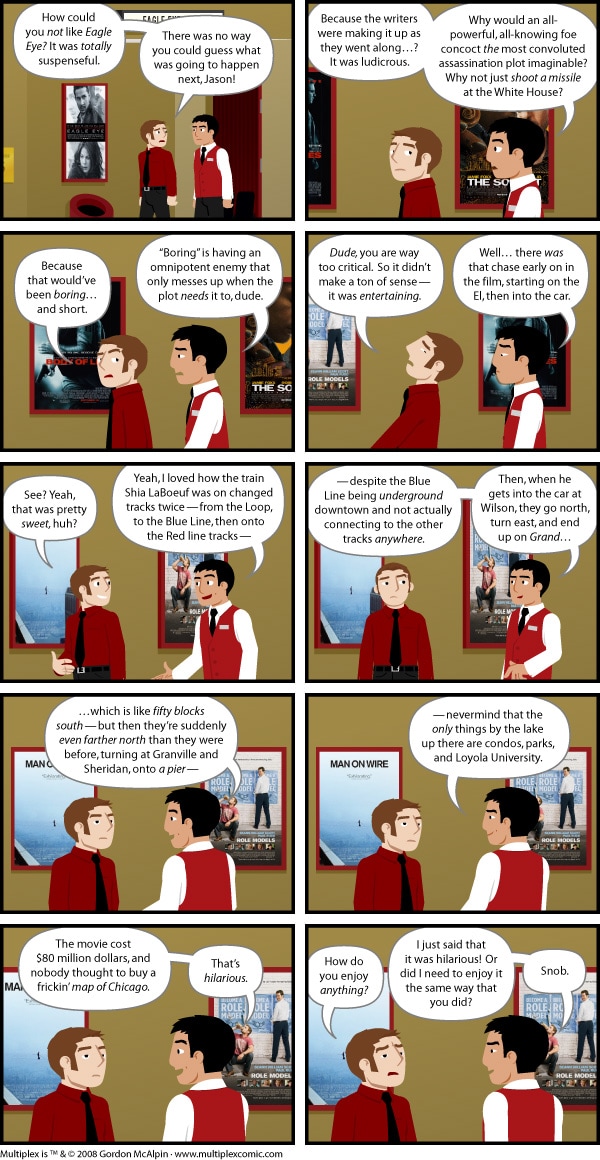If I was asked to described Multiplex, a long running webcomic that spanned over 12 years, the simplest explanation is that it is a comic about a movie theater. However, that explanation doesn’t really do the series justice. Multiplex is about the workplace antic that Gordon McAlpin’s characters partake in as they work in a theater. It’s a romantic comedy, looking at how people change (or don’t) over time and find the people they need at the times they need to. It’s a critique on cinema, with movie reviews and commentary about trope. And at times, particularly during Multiplex: The Revenge, it’s corporate thriller with kinetic action sequences. But I suppose at its core, it’s a character study. McAlpin even concedes that in the preface of his newest book, he wanted to explore “the kind of changes that happen to people (and businesses and industries) not overnight but over the course of several years.”
Multiplex: The Revenge is the third print installment of the Multiplex webcomic. It’s a collection of Chapters 11-15 of the series, covering a period of time between March 2008 and March 2009. McAlpin’s introduction to the book serves as the perfect recap of Chapters 1-10, seamlessly introducing the cast of characters and their dynamics through evocative scenes that perfectly capture the core duo of Jason, the film critic archetype, and Kurt, the movie fanboy. While I fully recommend picking up Books 1 and 2, McAlpin takes great effort in making sure the series is accessible and you don’t experience continuity lockout, a common occurrence with any long running piece of media.
The book starts with Jason reaccelerating to life at the theater after he attempted to distance himself from the place due to his messy relationship with coworker Becky. Jason is not the most sympathetic character when we meet him. He is snarky, caustic, a bit of a know-it-all, and needs to be the right side of the argument to be happy. He is also one of the most relatable characters this mixed Filipino American has had the pleasure of reading in all of my pop culture consumption. Jason is largely situated from McAlpin’s own experiences, and in his annotations during the first chapter about the atheist Jason dating the very Christian Angie, we see Jason slowly taking steps in order to become a better person, and a journey that we see slowly unfold over the next chapters.
As the book continues, we also see the dynamics of the theater playout. We get an insider’s look into what the employees do after hours. We see the joy they take in dressing up for major theater releases and interacting with parents and adults. We see them in advanced screenings of film, and watching a wide ranges of movies from blockbusters to smaller indie joints. McAlpin says in his autobiography that he’s never worked in a movie theater, but you’d be easily forgiven given that amount of detail and evidence of research that he has put to make it feel like an authentic theater. You can feel McAlpin’s love of cinema in every panel; all of the jokes and criticism come from a place of wanting better media, of wanting better stories for everyone.
As the book continues, we also see one of the defining arcs of Multiplex unfold as Gretchen, a would-be journalist who is a bit confused between the difference of truthful news and sensationalism, throws wrenches into the theater through a combination of snitching, prying, and “reporting.” Her actions have massive ramifications throughout the book, but her character is less outright villainous and more overtly antagonistic. The actual big bads of the story find more subtle ways to interfere with our lovable ragtag bunch of misfits, and we see the seeds of future story arcs cleverly planted, and the final set piece is a perfect conclusion to this particular saga.
McAlpin’s style is visually stunning and unique. He manages to show a wide range of talent, as he alters his stylistic presentation to match the medium he is telling in. His crisp, elegant character design of the Multiplex staff stands in contrast to the flowing, kinetic black and white depictions of video games. His Mario Kart is one of my personal favorites. This collection effortlessly translates the single strips into a beautiful book, creating a much more active pacing, while still maintaining the punch necessary of individual jokes.
Having been a fan of the original webcomic, I was/am really excited for the opportunity to share this with our FreezeRay fanbase. And if you’re a long term fan of the comic, the additional strips and commentary are more than worth that purchase. There is an authenticity and honesty in this story that is sometimes hard to find. But McAlpin manages to capture the cinematic year and create a cast of characters that feel familiar. Multiplex: The Revenge succeeds where many other period pieces fail. It is grounded in its present, but still remains timeless. Still remains truthful. If you are a fan of workplace comedies, of romantic comedies, of slice-of-life, of movies, of comics, I can pretty confidently say you’ll be a fan of Multiplex. McAlpin has created a diverse cast of characters, and you’ll be right at home.
Multiplex: The Revenge is available now. And if you liked what you read, consider supporting Gordon McAlpin at his Patreon.
Mikkel's audio review of the whole Multiplex phenomenon will be available for your ears via our podcast Broadcasts From The Watchtower soon!




 RSS Feed
RSS Feed